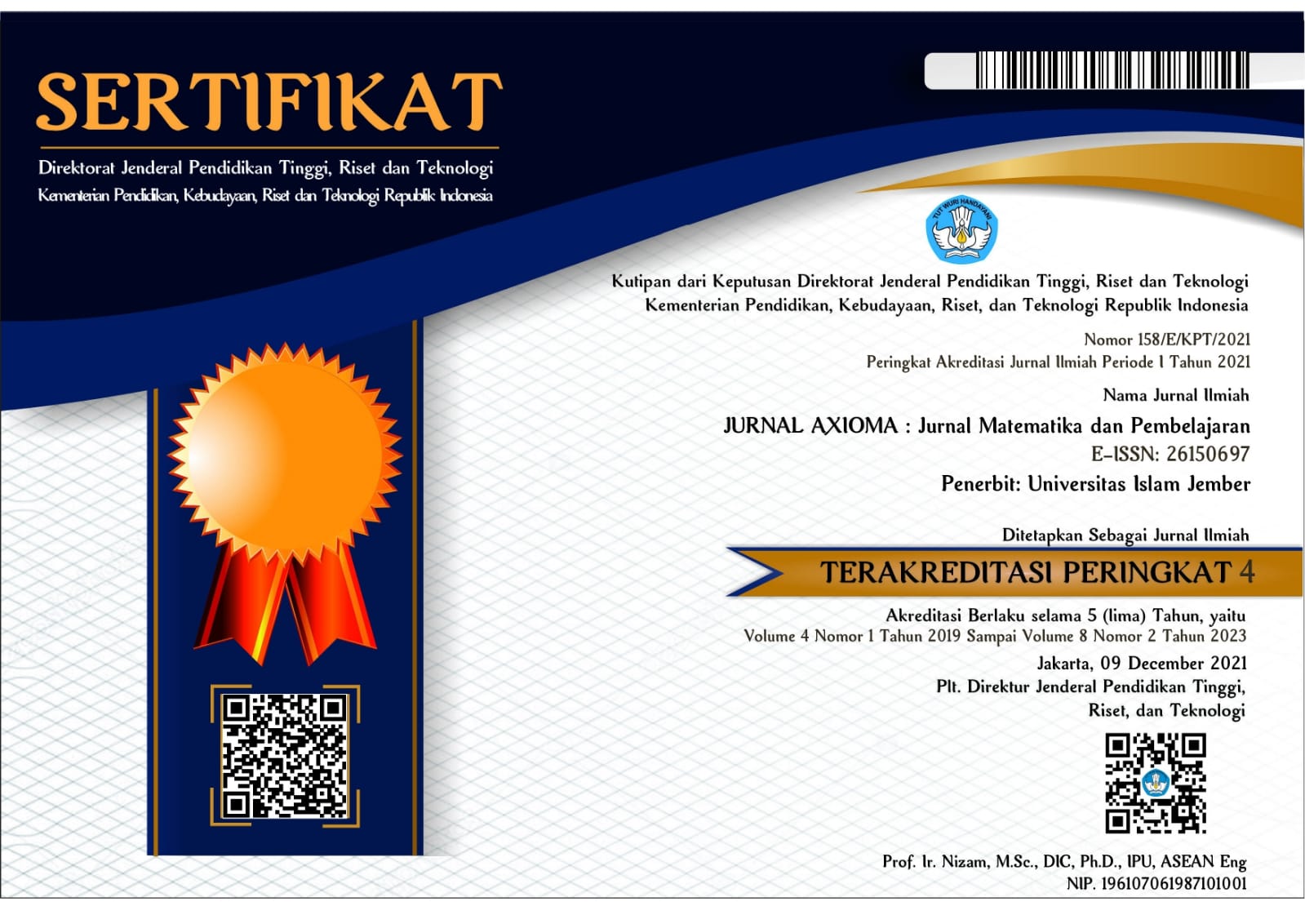The Effect of Problem Possing Assisted Mind Mapping on Problem Solving and Reasoning Skill in Terms of Cognitive Style
Abstract
The purpose of this research was to investigate the effects of Problem Posing learning facilitated by Mind Mapping toward problem solving and reasoning abillity based on students’ cognitive style. Totally, there were 106 students involved in the study which comprised of 42 students from VIIE class of SMPN 7 Jember as experimental group (PPMM class), 42 students from VIIF class of SMPN 7 Jember as the first control group (PP1 class) and 32 students from VIID class of SMPN 1 Arjasa as the second control group (PP2 class). Before giving the treatment, students was given GEFT test to know the kind of cognitive style that they have. There are two kind of student’s cognitive style in this paper i.e. field-dependent and field-independent cognitive style. The study found that student’s problem solving and reasoning abillity of PPMM class are better than PP class. Moreover, problem solving and reasoning abillity of field independent students is better than field dependent students.
Keywords: problem possing, mind mapping, problem solving, reasoning, and cognitive style
References
Awofala, A..2011. Effect of Concept Mapping Strategy on Students’Achievement in Junior Secondary School Mathematics. International Journal of Mathematics Trends and Technology, Volume2 Issue3: (hlm. 11-16).
Brinkmann, A. 2008. Investigating the Use of Concept Mapping as Tools in Mathematics Education. Germany: University of Münster.
Buzan, T.2013. Buku Pintar Mind Map. Jakarta : Gramedia.
English,L.1998.Children’s Problem Posing within Formal and Informal Contexts. Journal for Research in Mathematics Education, 29 (1): (hlm.83-107).
Herawati, O.; Siroj, R.; Basir, D.2010. Pengaruh Pembelajaran Problem Posing terhadap Kemampuan Pemahaman Konsep Matematika Siswa. Jurnal Pendidikan Matematika, Vol 4. No.1: (hlm.70-80) .
Khoiriyah, N.; Sutopo; Aryuna,D.2013. Analisis Tingkat Berpikir Siswa Berdasarkan Eori Van Hiele pada Materi Dimensi Tiga Ditinjau dari Gaya Kognitif Field-dependent dan Field-independent. Jurnal Pendidikan Matematika Solusi, Vol.1 No.1: (hlm.18-30).
Kojima, K.; Miwa, K. & Matsui, T.2009. Study on Support of Learning from Examples in Problem Posing as a Production Task. Proceedings of the 17th International Conference on Computers in Education [CDROM]. Hong Kong: Asia-Pacific Society for Computers in Education.
Madar, A.&Buntat, Y. 2010. Gaya Kognitif dan Visualisasi Pelajar Melalui Perisian Multimedia. Jurnal Masalah Pendidikan, 31 (1): (hlm. 181-192). Malaysia: Universiti Teknologi Malaysia.
Mahmudi, A. 2010. Mengukur Kemampuan Berpikir Kreatif Matematis. Makalah Disajikan Pada Konferensi Nasional Matematika XV UNIMA Manado, 30 Juni-3 Juli 2010.
NCTM (1989). Principles and Standards for School Mathematics. Reston, VA: NCTM.
Reta, K. 2012. Pengaruh Model Pembelajaran Berbasis Masalah terhadap Keterampilan Berpikirkritis Ditinjau dari Gaya Kognitif Siswa. Jurnal Penelitian Pascasarjana Undiksha, Vol. 2 No. 1(2012) : (hlm. 1-17).
Silver, E. 1994. On Mathematical Problem Posing. Jurnal For the Learning of Mathematics, 14 (1):19-28. http://www.jstor.org/discover/10.2307/40248099?uid=3738224&uid=2129&uid=2&uid=70&uid=4&sid=21102527714687, diakses tanggal 15 Juli 2013.
Silver, E & Cay, J. 1996. An Analysis of Arithmetic Problem Posing by Middle School Students. Journal for Reaserch in Mathematic Education, Vol.27/No.5 ( hlm. 521-539).
Slameto. 2003. Belajar dan Faktor-Faktor yang Mempengaruhinya. Jakarta: Rineka Cipta.
Sugiarto, I. 2004. Mengoptimalkan Daya Kerja Otak dengan Berfikir Holistik dan Kreatif. Jakarta : Gramedia Pustaka Utama.
Susanto, A. 2008. Mahasiswa Field-independent dan Field-dependent dalam Memahami Konsep Grup. Disajikan dalam Seminar Matematika dan Pendidikan Matematika, UNY, Yogjakarta, 28 November 2008.
Susanto, H. 2012. Pemahaman Mahasiswa Field-independent dalam Pemecahan Masalah Pembuktian pada Konsep Grup. Jurnal Aksioma, Vol. 1 No.1: (hlm.37-44).
Swadarma, D. 2013. Mind Mapping dalam Kurikulum Pembelajaran. Jakarta: Elex Media Komputindo.
Syaban, M. 2009. Menumbuhkembangkan Daya dan Disposisi Matematis Siswa Sekolah Menengah Atas Melalui Pembelajaran Investigasi. Jurnal Educationist, Vol. III No. 2:(hal 129-136).
Usodo, B. 2011. Profil Intuisi Mahasiswa dalam Memecahkan Masalah Matematika Ditinjau dari Gaya Kognitif Field-dependent dan Field Independen. Prosiding Seminar Nasional Matematika dan Pendidikan Matematika UNS 2011.
Yuwono, I. 2006. Pengembangan Pembelajaran Matematika secara Membumi. Disertasi tidak dipublikasikan. Surabaya: PPs UNESA.
Downloads
Published
How to Cite
Issue
Section
License
Copyright (c) 2016 Jurnal Axioma : Jurnal Matematika dan Pembelajaran

This work is licensed under a Creative Commons Attribution 4.0 International License.


2.jpg)
.jpg)











